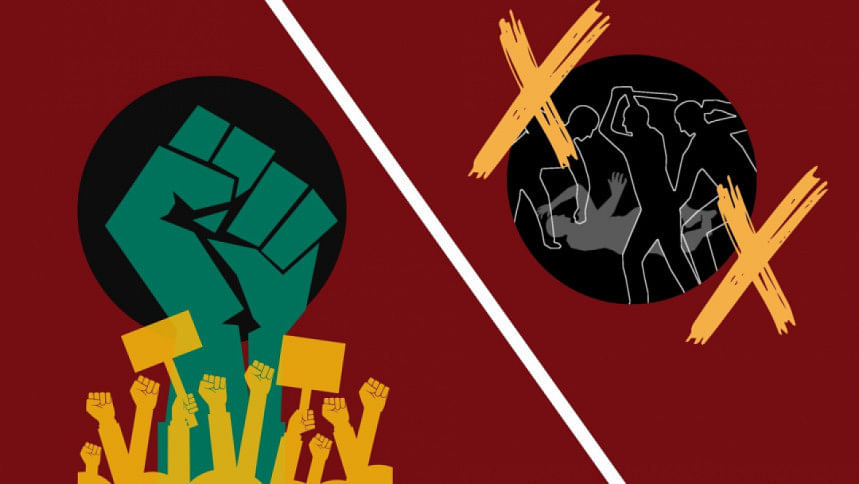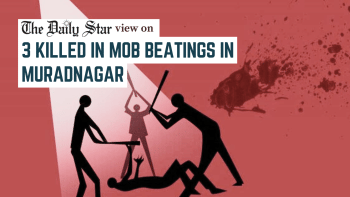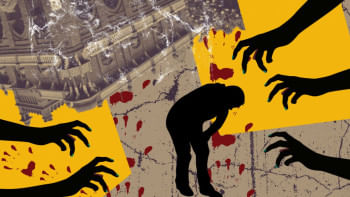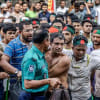There can be no justice without due process

"Ochlocracy," rule by the mob rather than by law, may sound like a term from an old political science textbook. But it is becoming an urgent and perilous reality in Bangladesh today. At its heart, mobocracy signals the breakdown of legal order, where justice is hijacked by angry crowds, spurred more by rumour, outrage or political manipulation than by evidence or process. As mob rule takes root, the judiciary is bypassed, legal procedures are abandoned, and lives are destroyed—without charge, trial or truth.
We have seen this play out repeatedly. In recent months, several individuals accused—sometimes falsely—of theft or abduction have been lynched by mobs. Baseless rumours spread via social media have incited crowds, often targeting political adversaries or vulnerable segments of society. University campuses have become volatile arenas for politically charged confrontations, where shouting crowds override reasoned dialogue. In one particularly disturbing incident, a former chief election commissioner was physically assaulted outside his residence before police intervened and placed him under arrest. The event was significant enough to garner coverage from Western outlets, which underscored how deeply mob culture has taken root in Bangladesh. In some cases, law enforcement is a passive observer, arriving too late or not at all.
Importantly, mob rule in Bangladesh is not a sudden or isolated development. It did not emerge solely under the current administration, nor can its origins be attributed to any single political party or regime. Rather, it is the outcome of a cumulative breakdown—a long erosion of public trust and institutional accountability that dates back to the country's early years. One notable incident, reported by Time magazine, took place in early 1972 near the Dhaka Racecourse (now Suhrawardy Udyan), where four men accused of a crime were publicly tortured and then bayoneted to death in front of thousands of spectators, with Western journalists present to document the event. From the outset, successive governments failed to build a robust and impartial justice system. Political violence, impunity and the patronage-driven politicisation of institutions allowed mob justice to take root, slowly undermining the authority of courts and the legitimacy of state power.
Three forces have brought the current crisis to a head. First, the collapse of trust in the police, courts and administrative fairness has led many citizens to seek quick, often brutal retribution outside the law. Second, social media, unregulated and lightning-fast, now serves as a breeding ground for misinformation and public hysteria. A single doctored video or false claim can ignite widespread vigilante violence before facts have a chance to surface. Third, political actors in an increasingly polarised environment have at times condoned or even mobilised crowds for intimidation or revenge, blurring the line between protest and chaos.
The consequences of mob rule are not only social and political, they are also profoundly economic. An environment where the rule of law is weak and public order is unstable inevitably deters both domestic and foreign investment. Investors value predictability and institutional integrity. When mobs operate with impunity, and when business disputes or labour conflicts are resolved by force rather than arbitration, capital takes flight. Consider Nigeria, where episodes of mob violence and kidnappings in certain regions have led multinational firms to shut down operations or avoid investment altogether. In India, vigilante attacks have disrupted interstate commerce and discouraged investments in specific sectors such as cattle trading and food logistics. Bangladesh risks similar fallout. If potential investors believe that contracts will not be enforced and property rights are not secure, they will look elsewhere, perhaps to Vietnam, India or even Africa, for more reliable destinations. Economic activity thrives on trust and legal enforcement. Without these, markets shrink, jobs disappear, and growth falters.
It must also be clearly stated that condemning mob rule and upholding the rule of law does not mean condoning or protecting criminals. Quite the contrary. It means ensuring that all individuals—whether powerful or powerless—are subject to the same laws, and that guilt or innocence is determined through due process, not by the pitch of a mob's fury. It is not a defence of impunity, but a call for principled justice. A functioning legal system is not an obstacle to justice; it is the only guarantee of it. By contrast, mob violence often targets the innocent or the falsely accused, and once unleashed, it cannot be easily contained. It erodes civil liberties, destabilises communities and replaces justice with arbitrary vengeance.
This pattern is not unique to Bangladesh. In Somalia, where the state collapsed in the early 1990s, clan-based militias and mob justice became the default system. With no functioning government or rule of law, warlords and armed gangs decided life-and-death matters, plunging the country into an enduring anarchy. The Central African Republic, wracked by civil strife, saw religious mobs engage in tit-for-tat massacres, displacing entire communities. In Libya, the fall of Gaddafi left a power vacuum filled by militias and mobs, whose street justice quickly replaced any semblance of order. Even advanced democracies have been shaken by episodes of mob violence. In India, vigilante killings over allegations of cow slaughter have occurred with alarming frequency.
Yet other countries offer a more hopeful path. Singapore, once riddled with race riots and gang violence in the 1950s and 60s, overcame mob tendencies through firm governance, civic education and institutional reform. It invested heavily in building a meritocratic civil service and an efficient, respected police force. Today, the rule of law—not mob rule—defines public life. Rwanda, after the horrors of genocide driven by widespread ethnic hatred in the 1990s, rebuilt social trust through community-based justice and reconciliation efforts. Sierra Leone, emerging from a civil war that lasted until 2002, undertook a long process of rebuilding its institutions, reintegrating former fighters, and restoring public order.
If Bangladesh is to avoid the fate of countries where mob violence spiralled into chaos, it must act decisively, both at the level of the state and society. At the state level, the most urgent task is to strengthen the police, thereby restoring faith in law enforcement and the justice system. This means ensuring timely investigations, fair trials, and insulating the judiciary and police from political interference. Law enforcement agencies must be professionalised and resourced to respond swiftly and impartially to threats of mob violence. Laws against incitement must be enforced consistently, both online and offline, and without regard to political affiliation.
At the societal level, education must be a central pillar of change. Schools should teach not only technical skills, but civic values—respect for legal institutions, tolerance, and critical thinking. Civil society and religious leaders should serve as voices of restraint, helping communities reject vigilante impulses in favour of peaceful resolution. The media have a special responsibility to avoid sensationalism and instead provide responsible, fact-based reporting that can defuse tensions rather than stoke them.
Mob justice is not justice. It is a form of collective lawlessness that corrodes democracy, retards economic progress, and endangers the vulnerable. If left unchecked, it threatens to reduce Bangladesh to a society ruled by fear, where the loudest crowd decides guilt, and truth is irrelevant.
Bangladesh is at a crossroads. It can either drift further towards mob rule or reclaim the promise of a just society governed by laws and institutions. That choice rests not only with government officials and judges, but with all citizens. Citizens must reject shortcuts to justice, demand institutional accountability, and insist that power be exercised not in the streets, but through the rule of law.
Dr M.G. Quibria is an economist and former senior adviser at the Asian Development Bank Institute (ADBI). He can be reached at [email protected].
Views expressed in this article are the author's own.
Follow The Daily Star Opinion on Facebook for the latest opinions, commentaries and analyses by experts and professionals. To contribute your article or letter to The Daily Star Opinion, see our guidelines for submission.

 For all latest news, follow The Daily Star's Google News channel.
For all latest news, follow The Daily Star's Google News channel. 











Comments